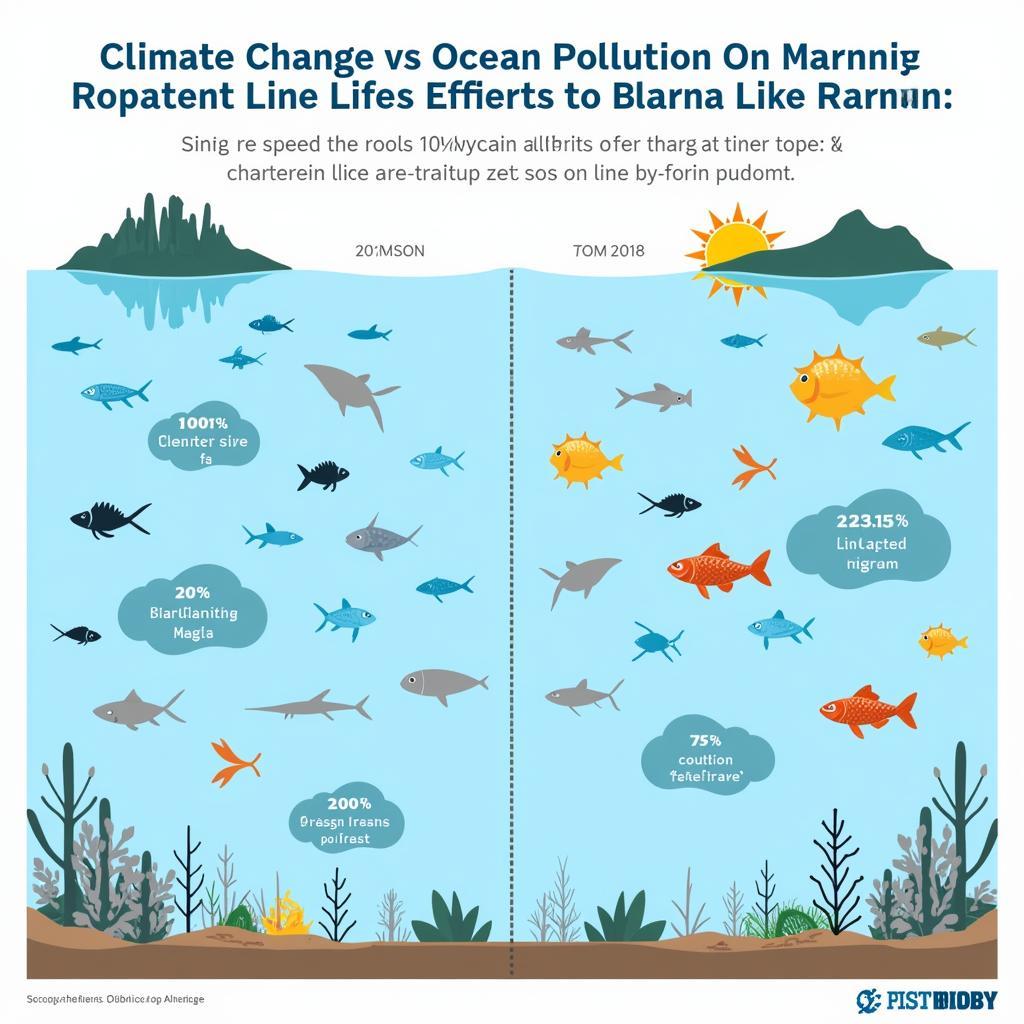Climate change and its effects on marine ecosystems have become increasingly prominent topics in IELTS Writing Task 2. Based on recent exam patterns and The effects of climate change on global biodiversity, this theme appears in approximately 15% of environment-related questions, making it crucial for IELTS candidates to prepare thoroughly.
Let’s analyze a recent IELTS question that exemplifies this topic:
Some people believe that climate change is the biggest threat to ocean biodiversity, while others think ocean pollution poses a more serious risk. Discuss both views and give your opinion.
Analysis of the Question
- Topic: Environmental issues
- Task: Discuss both views + opinion
- Key points to address:
- Climate change impacts on oceans
- Ocean pollution effects
- Compare and evaluate both threats
- Personal stance with justification

Sample Essay 1 (Band 8)
The debate over whether climate change or ocean pollution presents the greatest danger to marine biodiversity has gained significant attention. While both factors pose serious threats, I believe climate change has more severe and far-reaching consequences for ocean ecosystems.
Climate change fundamentally alters marine environments through various mechanisms. Rising sea temperatures and ocean acidification, as discussed in impact of ocean acidification on ecosystems, directly affect coral reefs, which support approximately 25% of marine species. Moreover, changing water chemistry disrupts the entire food chain, from microscopic plankton to apex predators. These systemic changes are often irreversible and affect entire ecosystems simultaneously.
Ocean pollution, while undeniably harmful, tends to have more localized impacts that can potentially be addressed through targeted interventions. Plastic waste, chemical runoff, and oil spills certainly damage marine life and habitats, as evidenced by impact of ocean pollution on food chains. However, with proper waste management and environmental regulations, these issues can be mitigated more readily than global climate change effects.
In my opinion, climate change poses the greater threat because its impacts are more pervasive and challenging to reverse. While pollution can be cleaned up through concentrated efforts, the fundamental changes in ocean chemistry and temperature caused by global warming require massive, coordinated international action to address. Furthermore, these changes trigger feedback loops that can accelerate environmental degradation.
To conclude, although both issues demand urgent attention, climate change’s systemic and long-lasting effects on ocean biodiversity make it the more critical threat requiring immediate global action.
Sample Essay 2 (Band 6.5)
Many people argue about whether climate change or ocean pollution is worse for sea life. I will discuss both problems and share my thoughts on this issue.
First, climate change affects the oceans in many ways. When temperatures rise, it makes the water warmer and more acidic. This kills coral reefs and makes it hard for some sea animals to survive. Also, melting ice caps change water levels and affect marine animals’ homes.
On the other hand, ocean pollution is also very harmful. Plastic waste kills many sea creatures who eat it or get trapped in it. Chemical pollution from factories and farms makes the water toxic for fish and other marine life. Oil spills can destroy entire areas of ocean habitat.
In my opinion, climate change is more dangerous because it affects everything in the ocean at once. While we can clean up pollution in specific areas, it’s much harder to stop the ocean from getting warmer. Also, climate change makes other problems worse, like when warmer waters make pollution more toxic.
To sum up, both climate change and pollution hurt ocean life, but climate change seems more serious because its effects are harder to fix and affect larger areas.
Key Vocabulary
- Biodiversity (n) /ˌbaɪəʊdaɪˈvɜːsəti/ – the variety of plant and animal life
- Ecosystem (n) /ˈiːkəʊˌsɪstəm/ – all living things in an area and the way they affect each other
- Ocean acidification (n) /əˌsɪdɪfɪˈkeɪʃn/ – decrease in seawater pH due to CO2 absorption
- Apex predator (n) /ˈeɪpeks ˈpredətə/ – predator at the top of a food chain
- Systemic (adj) /sɪˈstemɪk/ – affecting an entire system
- Pervasive (adj) /pəˈveɪsɪv/ – spreading widely throughout an area or group
- Mitigation (n) /ˌmɪtɪˈɡeɪʃn/ – the action of reducing the severity of something
For practice, try writing your own essay on this topic and share it in the comments. Similar topics might include The impact of climate change on global weather patterns or specific aspects of effects of climate change on marine life.